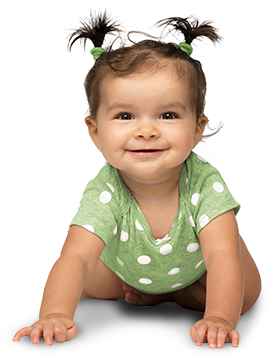Feeding
It is time to start weaning your baby at six months of age, according to government guidelines.
Research shows that babies need nothing but breast milk or infant formula for the first six months of life as this gives a baby’s digestive system time to develop, allowing them to cope fully with solid foods such as purées and cereals mixed with milk.
Nappies
After you start weaning, your baby’s poo will become firmer, darker in colour and smellier. You should maintain his fluid intake to ensure he does not get constipated. Weaning is commonly associated with nappy rash.
Sight
By five months, your baby will be getting better at examining objects closely and spotting small things.
He will enjoy ‘peek a boo’ or playing hide and seek with toys, as well as mimicking facial expressions.
Hearing & speech
By now, your baby is able to turn towards sounds and voices. He will be imitating sounds and may enjoy blowing bubbles.
Sleep
Between three and six months babies usually sleep for around five hours during the day and ten hours at night.
Weight gain
By five to six months of age, your baby’s birth weight should have doubled.
Physical development
Your baby will be able to sit well with support, holding his head up and his back straight. He may be able to sit for a moment without your help. Just make sure you stay nearby to provide support or surround him with pillows to cushion a possible fall.
Soon he’ll work out how to keep his balance while seated, by leaning forward on one or both arms.
Start thinking about baby proofing your home ready for crawling.


